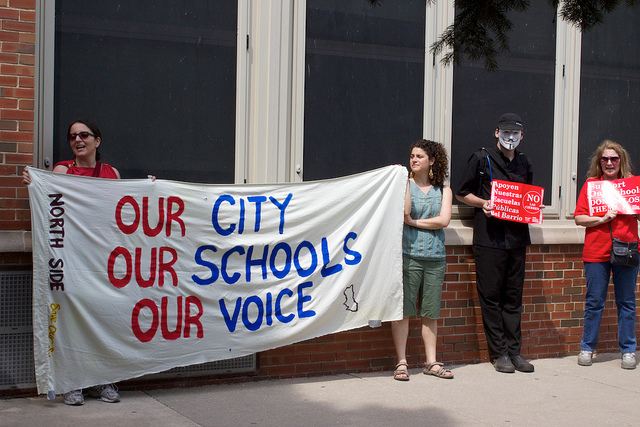Local Filmmakers Band Together To Produce Documentary On CPS School Closures
By Chuck Sudo in Arts & Entertainment on Aug 19, 2013 6:35PM

Protesters outside Courtenay Elementary, located half a block from the Mayor Emanuel's residence, in May. (Photo credit: Jessica Fenton
Chicago Public Schools’ decision to shut down 50 schools earlier this year made national headlines for being the largest single set of public school closings in American history and it’s a subject that would seem ripe for a documentary film treatment. That’s exactly what’s happening as a lineup of respected documentary film producers are banding together in an unprecedented show of unity to chronicle the story.
Reel Chicago reports Kartemquin Films, Siskel/Jacobs Productions, Media Process Group and The Kindling Group have teamed up for the documentary and are already following staff, students and their families from closing schools as they head to their new receiving schools. Siskel/Jacobs initiated the outreach to the other production houses in the spring and partner Jon Siskel said, “As documentary filmmakers we could dig deeper and stay with impacted communities in ways that other media can’t. Handling the closure of 50 schools was way too big for Siskel/Jacobs, but we thought maybe we could reach out to friends at other companies.”
The group is also working with Free Spirit Media, a West Loop company that offers video production training to teens.
Siskel/Jacobs is charting the move of students from Trumbull on the North side. Kartemquin is tackling LaFayette Elementary on the West side and Media Process Group is covering Overton School on the South Side. Filmmakers involved in the project are also interviewing figures like Chicago School Board member Andrea Zopp and WBEZ education reporter Linda Lutton. The group is in talks with WTTW to be the presenting station for the completed doc and accompanying short films, the Chicago History Museum on archiving the footage and has eyes on partnerships with Chicago Public Media and the Sun-Times. Reel Chicago notes crews are working for free and the united companies are working to raise funds. (They already have a grant from the Driehaus Foundation to cover hard costs.)
Siskel said working in unison will allow them to cut down the production costs and get the documentary finished sooner. “There’s this space between daily journalism and documentary, a big gap that people are trying to fill. It’s an interesting civic journalism project, to work in a way that would fill that gap.”